Last month, I rented Non-Stop, aka, the Liam-Neeson-on-a-plane movie, and was delighted by its rather meat-and-potatoes approach to a good, old-fashioned thriller. However, when I tried to convince my action movie-loving step-dad to give the film a look before I had to return it to Redbox he waved it away, arguing, “Eh. I’m sure it’s fine, but I’ve already seen a Liam Neeson action movie. They’re all pretty much the same.” This is the same man who took me to countless Arnold Schwarzenegger and Sylvester Stallone movies when I was a kid, the guy with whom I have watched countless old martial arts movies in my lifetime. He’s now turning down a chance to watch Non-Stop for free because, really, what’s the point after you’ve already seen Taken, Taken 2, The Grey, and Unknown? Oh, no. Have the dads of the world tired of Neeson? They’re the ones who helped fuel his action movie re-birth!
Of course, it’s insane to jump to conclusions based simply on one interaction I had with my elderly step-dad. Non-Stop did just fine for itself, making over 4 times its budget at the worldwide box office. It was his most successful non-Taken action film to date. However, the point remains that there is an assumption that his movies are all the same, which does kind of ingore the fact that in the past year alone he’s put in good-natured cameos, co-starring roles, or voice-over performances in Anchorman 2, A Million Ways to Die in the West, The LEGO Movie, and The Nut Job. Plus, he joined Crash director/writer Paul Haggis’ all-star cast (James Franco, Mila Kunis, Olivia Wilde, Adrien Brody, etc.) in Third Person, a romantic dramedy focusing on three different couples living in Rome, Paris, and New York. Of course, nobody went to see that during its limited release this summer (it’s actually still playing in 10 North American theaters), and most people don’t know it exists.
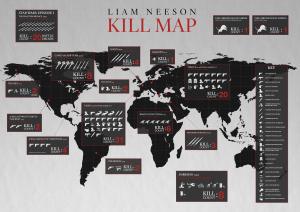
Is it a good or bad thing that it’s easy enough to make an infograph of all of Liam Neeson’s kills?
So, that means that his new film, A Walk Among the Tombstones (opening today), has all the looks of just being another standard Liam Neeson film. Just like Non-Stop, he’s again playing a recovering alcoholic who was once a cop but is now something else, an Air Marshall in Non-Stop, private detective in Tombstones. Plus, they throw in a bit of Taken since the main plot involves his character investigating a series of abductions, the new wrinkle being these are abductions targeting other criminals like a drug dealer played by Dan Stevens.
Here’s the thing, though: Walk Among the Tombstones is not Taken. It’s not Non-Stop. It’s not really an action film but instead a film noir thriller which BadAssDigest recently argued is “good enough” but would have likely made for an amazing AMC TV show. This is still Liam Neeson in bad-ass mode, but he’s playing a character who rarely ever even carries a gun let alone uses one. Here are some things worth knowing about this movie:
1. If it’s a hit, there are 17 other novels to choose from for the sequel
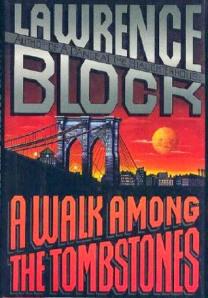
It is adapted from the 10th book in Lawrence Block’s long-running series of novels revolving around private investigator Matthew Scudder, which first started in 1976 and published its 18th installment last year.
2. It’s the first film the director has made since The Lookout
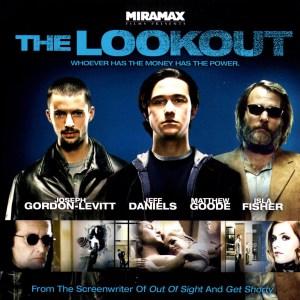
This is writer/director Scott Frank’s first feature film since 2007’s spectacular Joseph Gordon-Levitt-starring heist flick The Lookout, which was his directorial debut. In the interim, Frank co-wrote the screenplays for Marley & Me and The Wolverine. Huh. Walk Among the Tombstones, Lookout, Marley & Me, and The Wolverine. Which one of these is not like the other?
3. It’s been in development for over a decade, delayed in part due to Minority Report
 Scott Frank first encountered Lawrence Block’s novels in 1998, but he skipped the first 8 because he’d been told the 9th and 10th installments, A Dance at the Slaughterhouse (1991) and Walk Among the Tombstones (1992), were the best. Tombstones immediately jumped out at him as the New York City private detective movie he’d been wanting to make for years. He got sidetracked when Steven Spielberg hired him to write Minority Report, but finished his Tombstones screenplay in 2001.
Scott Frank first encountered Lawrence Block’s novels in 1998, but he skipped the first 8 because he’d been told the 9th and 10th installments, A Dance at the Slaughterhouse (1991) and Walk Among the Tombstones (1992), were the best. Tombstones immediately jumped out at him as the New York City private detective movie he’d been wanting to make for years. He got sidetracked when Steven Spielberg hired him to write Minority Report, but finished his Tombstones screenplay in 2001.
Then it sat for over a decade with all of the Hollywood studios telling Frank there was no market for this type of film anymore because audiences had stopped supporting low-budget adult drama-thrillers. That’s where it would have ended if not for the convenience of Neeson, who had been attached to the script through his agent, turning into an international star after Taken.
4. There is a somewhat contrived kid sidekick who they legitimately found through YouTube
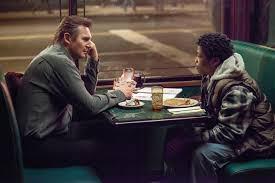 In the film, Schudder eventually befriends and mentors a homeless kid (Brian “Astro” Bradley) who aspires to someday be his own version of Sam Spade. Their relationship is probably somewhere in-between the bickering of Indiana Jones and Short Round in The Temple of Doom and the outright hostility between Tony Stark and the Justin Bieber haircut kid in Iron Man 3. Well, “Astro” might look familiar to X Factor fans. According to Frank, he discovered “Astro” when he was sent a YouTube link featuring the kid’s X Factor appearance.
In the film, Schudder eventually befriends and mentors a homeless kid (Brian “Astro” Bradley) who aspires to someday be his own version of Sam Spade. Their relationship is probably somewhere in-between the bickering of Indiana Jones and Short Round in The Temple of Doom and the outright hostility between Tony Stark and the Justin Bieber haircut kid in Iron Man 3. Well, “Astro” might look familiar to X Factor fans. According to Frank, he discovered “Astro” when he was sent a YouTube link featuring the kid’s X Factor appearance.
5. This is a side of Dan Stevens we’ve never seen before
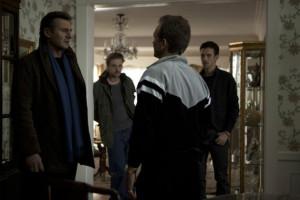 He was a heartthrob as Matthew Crawley on Downton Abbey, but Dan Stevens plays a very different character in Tombstones, a drug dealer who hires Neeson’s character to find the bastards that kidnapped and killed his wife. Director Scott Frank loved watching Stevens stretch his range for the film, telling Collider:
He was a heartthrob as Matthew Crawley on Downton Abbey, but Dan Stevens plays a very different character in Tombstones, a drug dealer who hires Neeson’s character to find the bastards that kidnapped and killed his wife. Director Scott Frank loved watching Stevens stretch his range for the film, telling Collider:
You want somebody who’s going to bring something interesting to it and really create a character with you. You see that with certain actors. It’s also fun to pull people in a different direction. I did that with Matthew Goode in The Lookout, and it was fun to do that with Dan Stevens in this movie – to just pull him into a darker place. He’s such a good actor. He was able to do that. He was really able to disappear into it. Many people don’t know it’s him. When they see the movie, they go, “Which one was Dan Stevens?” They don’t know.
6. It’s mostly set in 1999
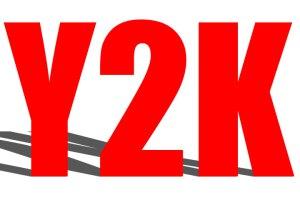 After an opening scene in 1991, the majority of the film takes place in 1999. Some of that is simply because that’s around the time the script was being written. However, Scott Frank told Collider that they declined to update things to take place in the present because 1999 and the over-hyped Y2K fear was an interesting dramatic backdrop for a film featuring two largely unknowable and unforseen villains:
After an opening scene in 1991, the majority of the film takes place in 1999. Some of that is simply because that’s around the time the script was being written. However, Scott Frank told Collider that they declined to update things to take place in the present because 1999 and the over-hyped Y2K fear was an interesting dramatic backdrop for a film featuring two largely unknowable and unforseen villains:
What was great about it taking 10 or 12 years to get the movie made was that Y2K happened and you had the benefit of this great hindsight, wherein 1999, we were all afraid of the wrong thing. It now almost seems quaint given what’s happened, i.e., 9/11. It almost seems ridiculous. Meanwhile, out there in the world was this thing happening that we weren’t paying attention to. For me, I felt like I could organize my creative brain around that idea that these two guys were a harbinger of something coming that nobody noticed, that there they were every day in the world and nobody was taking them seriously. Nobody was paying attention to them. Nobody could even describe them when it came time to describe them.
7. It’s not as violent as you might expect.
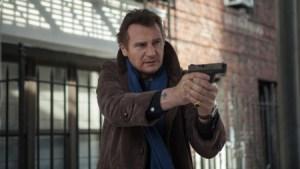 After the film’s big opening action set piece, there is only intermittent action from that point forward, and it’s only natural to wonder if this made the studio nervous. According to Scott Frank, they were cool with it:
After the film’s big opening action set piece, there is only intermittent action from that point forward, and it’s only natural to wonder if this made the studio nervous. According to Scott Frank, they were cool with it:
Everybody embraced from the get-go what the movie was. The people who put up the money were concerned as to how to sell it obviously, but nobody ever said to me, “We need to do more of this. We need to do more of that. We need to find an extra scene to drop in.” It was interesting. They embraced it for what it was. Even the pace of it, it is a very deliberate pace.
8. It is deliberately long and kind of slow
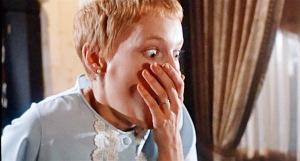
Most of the reviews seem to argue that Walk is at least 10 minutes too long. However, the director disagrees (of course he would), explaining how the deliberately slow pace was a bit of a throwback:
I don’t think it’s boring. It’s refreshing because I miss movies like this where you’re not cutting all the time. This movie opens after that shootout, that bit of violence. There’s a scene of Liam Neeson sitting in a booth in a diner in profile. He’s sitting there and a guy walks up and puts his back to camera. His back is to camera for 43 seconds. And then, he sits down in the booth and they have a conversation for another 30 seconds. And then, we cut. Today, there’s always this instinct to just start chopping it up and pacing it up and doing it, and you don’t get to know anybody. You don’t feel anything. You don’t ever lean in because they’re doing the work for you. I love Alan Pakula. I love Klute. I love these movies where you’re constantly doing this. You watch Rosemary’s Baby and you’re here. We don’t do that anymore. We tell you where to go. We tell you where to look. We blow up shots so that you can see everything better. It was really important to us.
He wasn’t always so secure about that, though. Early on the post-production process he had cut the film in a more commercial, quick-moving manner, and when he showed it to his friend Steven Soderbergh the Magic Mike director noticed immediately that Frank hadn’t really cut it the way it had been shot. So, on Soderbergh’s advice he completely re-edited it in the more deliberate manner he originally wanted.
9. The film itself may just be okay, but it’s one of Neeson’s better recent performances
At least that’s what RottenTomatoes argues, with a 65% critic approval rating and the following consensus:
A Walk Among the Tombstones doesn’t entirely transcend its genre clichés, but it does offer Liam Neeson one of his more compelling roles in recent memory, and that’s often enough.
Are you planning on seeing Walk Among the Tombstones this weekend? Or is it not really your thing? Do you miss the days when Liam Neeson was the lovable dad in Love Actually? Or do you totally dig his action star re-birth? Let me know in the comments.
Source: Collider

